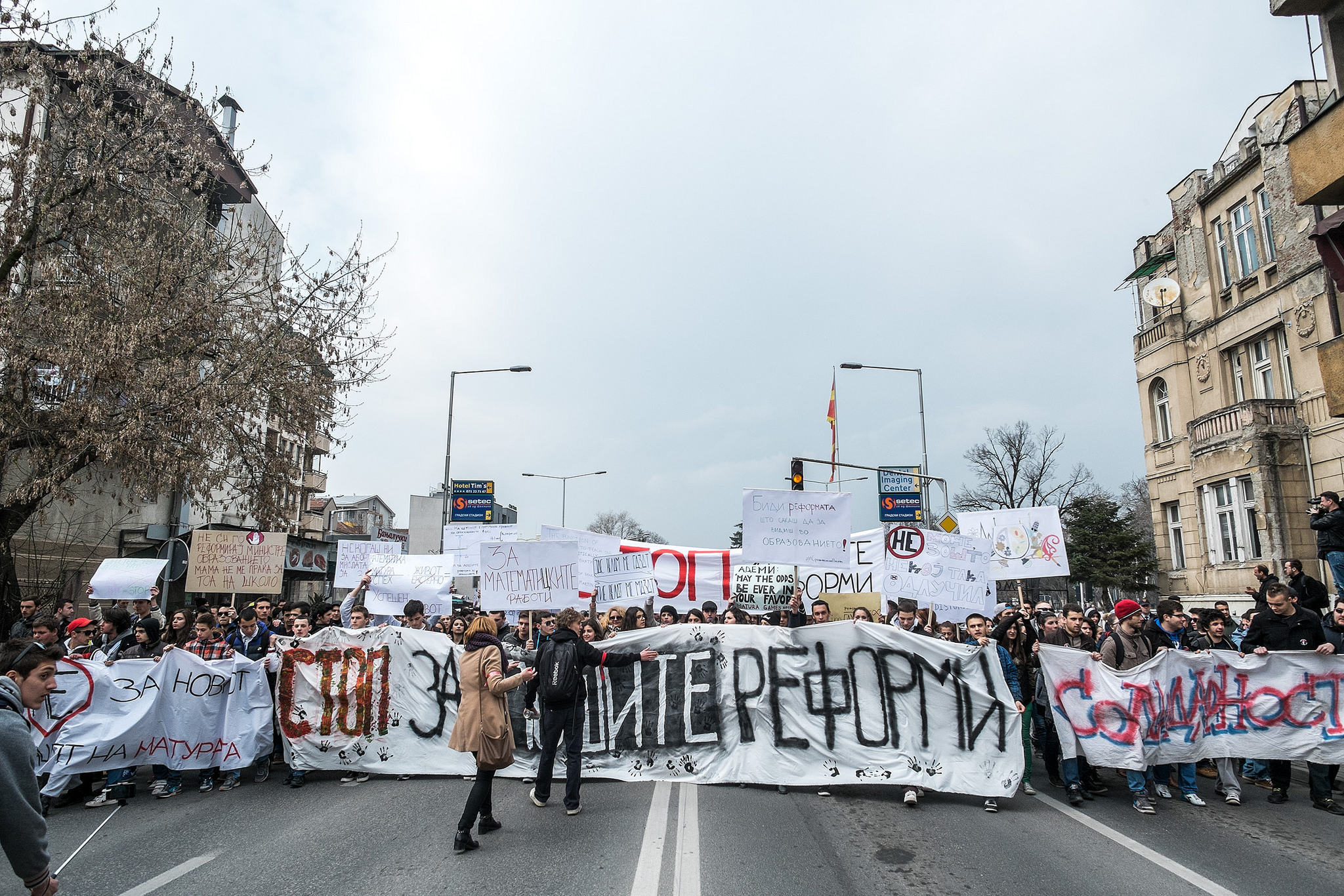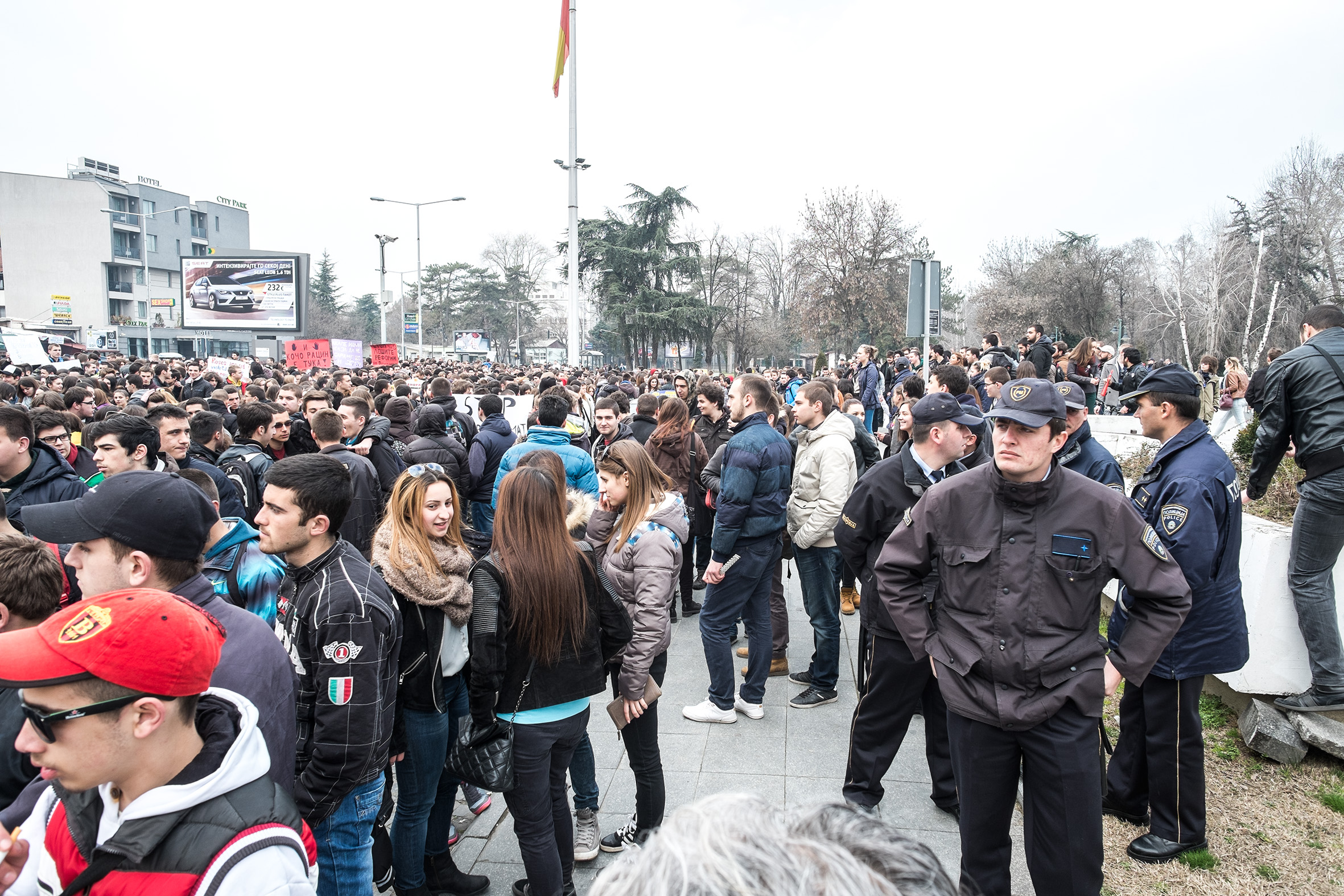
High school students march in downtown Skopje against controversial educational reforms. Photo by Vanco Dzhambaski, CC BY-NC-SA.
After university students and professors organized several marches to protest new laws related to Macedonia's education system, high school students in the capital Skopje organized a march of their own, braving a threatening counter-campaign by the government.
Hundreds of high school students gathered in the country's capital and thousands marched throughout the streets of several other Macedonian cities, including Tetovo, Resen, Kumanovo, Negotino, Bitola, and Struga, on March 19 under the motto “Stop the bad reforms in education.”
These protests came after the successful conclusion of a protest campaign by university students and professors, who objected to the new law on higher education, and staged massive protests and occupied faculties since late summer of 2014 and well into the new year. The government finally caved to the demands and agreed to draw up an entirely new law, without the controversial and unpopular external tests for Macedonian educational institutions that have triggered the protests through an inclusive parliamentary process.
External testing has already been implemented in primary and secondary schools in Macedonia, however, and these younger protesters consider it a tool for bureaucratic repression. Based on end-of-the-year multiple-choice tests, its critics claim it doesn't provide objective measurement of the knowledge acquired during the year and is used to traumatize both pupils and teachers, who may get salary reductions or worse if students post low test scores. It also encourages corruption, through dissemination and even sale of leaked test answers.
Networking against the state machine
The digital natives who are part of this protest movement use social media and online tools as their primary means for communicating with the public, including their High School Plenum Facebook page, the Twitter profile @plenumsredno, and the hashtags #СредношколскиПленум (High School Plenum), #СредношколскиМарш (High School March), and others. Communicating with a wider audience, outside their personal and everyday circles, seems to come naturally to many Macedonian high schoolers.

Hundreds of teenagers gathered for the protest in Skopje on March 21, 2015, and thousands in total gathered in other cities throughout the country. Photo by Vanco Dzhambaski, CC BY-NC-SA.
Activist and photographer Vanco Dzambaski provided information about the protests in his photo gallery from the Skopje protest:
Several thousand high school students marched the streets of Skopje, but also several other cities today, holding banners saying “We are the future” and “You will hear us now” starting from the city park and finishing in front of the building of the Ministry of Education and Science.
With this march, the students reinforced their demands aimed at the Ministry of Education and Science to place on hold the law changes on the external testing for high school students, and showed their revolt from the new concept of state graduation exam which begins implementation from this school year. With this, among other changes, taking an exam in Mathematics becomes compulsory for all high-school graduates, regardless of their primary subjects of program stream and future plans for faculties on which they would continue their education.
The protests took place in other cities as well: Tetovo, Resen, Kumanovo, Negotino, Bitola, Struga are some of the cities where high-school students marched the streets in these days. Their protests and actions were met with an anonymous counter campaign, posters with their names and statements that they were paid to organize them and they were controlled to do so, but also messages and phone calls not to protests, and even locked doors in schools at the time of the protests.
The external examination was also a controversial measure at the time it was introduced. Not being piloted before the errors in implementation were removed, its first implementation in 2013 was marked by a flawed process, damaged students, protests and a petition of 26.000 signatures unrecognized by the institutions.
A video by youth-run Internet-based Radio MOF also provides a feel of the atmosphere at the protests in Skopje. Radio MOF also aggregated special coverage of the High School Plenum activities.
‘Horrible methods’
As alluded to in Dzambaski's post, the ruling party-sponsored campaign against the protesters is full of dirty tricks. In addition to the labelling of the protesters as mercenaries paid by billionaire philanthropist George Soros or opposition leader Zoran Zaev, fake leaflets — branded as if made by the Plenum — have been distributed on the streets of Skopje.
Teachers have also threatened young students with bad grades and warned them their parents may be fired, with some even locking the students in the schools.
On Twitter, organized bribery attempts were reported. For instance, Twitter user @koropanovska wrote about a high school in Resen, a small town in the South of Macedonia:
ОВА ШО СЕ ДЕШАВА ВО НАШЕВО УЧИЛИШТЕ ЗА ДЕЦАВА ДА НЕ ИЗЛЕГУВААТ НА ПЛЕНУМОВ Е СТРАШНО.
— Симона за тро Бојана (@koropanovska) March 17, 2015
Horrible methods are used in our school to prevent the kids going out and joining the plenum.
@gemidjy @razvigor Се закануваат,даваат по 50 ден. да се откажеме,професори ќе не оставеле на полагање и слични работи.
— Симона за тро Бојана (@koropanovska) March 17, 2015
They threaten, they give 50 Denars [about 1 US $] per person, teachers say they will make us fail the year, and the like.
In one instance, Nova TV reported on the blockade of a vocational high school in Veles, a provincial town around 50 kilometres from Skopje, where the principal closed the doors to stop around a hundred students who tried to join the march. About twenty pupils managed to escape by jumping from the windows and over fences, while the rest were detained by the security detail.







16 comments